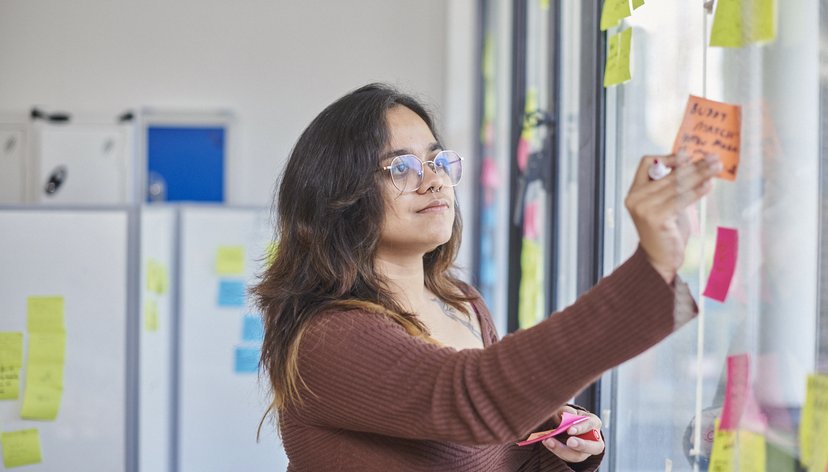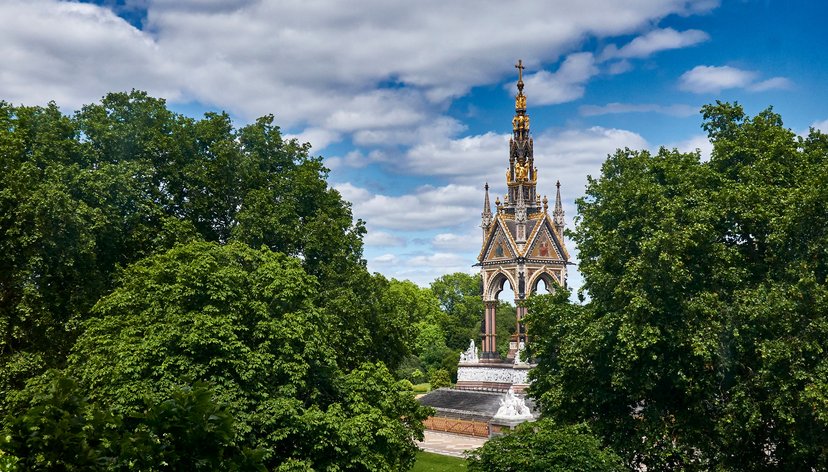Student Visa
Jump to
Information on who needs a Student Visa, and how and when to apply.
We understand that keeping up with immigration policies can be challenging. Our advisers are dedicated to providing the most accurate and current information. However, it's important to note that policy changes can happen unexpectedly, and our advisers have no control over them.
We want to remind you that it's ultimately your responsibility to ensure you comply with immigration requirements and check that any previous advice or information is still valid before taking action. We are here to support you through this process.
Who needs a visa to study at the RCA?
Most international students, including EU students who do not currently live in the UK, will need a Student Visa to study at the RCA.
You will not need to apply for a visa if you:
- are an Irish national
- have indefinite leave to remain in the UK
- are an EU national who moved to the UK before 30 December 2020 and have received settled status under the EU Settlement Scheme
- have indefinite leave to enter the UK, for example, if you have a Returning Resident Visa
Eligibility
To apply for a Student Visa, you must:
- Hold an unconditional offer to study at the RCA
- Have firmly accepted your offer
- Have paid all deposits due for your programme
- Have received a Confirmation of Acceptance of Studies (CAS) number for your visa application
Please note that you may only apply for a Student Visa three months before your programme's start date if you are currently in the UK, or six months before the start date if you are applying for the visa from outside the UK. We will aim to issue your CAS in line with these dates.
Visit the CAS number webpage for more information on how and when you will receive your CAS number.
How to apply
Step 1: Getting your CAS
We will start to process your CAS number after you have:
- accepted your offer
- uploaded all required documents
- paid your deposit
The timings also depend on whether you are inside or outside the UK.
Refer to the CAS Number webpage for more information.
Step 2: Meet the UKVI financial requirement for your application
When applying for a visa, you must show you have sufficient funds to cover your tuition fees and living expenses for one academic year.
How much money do I need?
The new maintenance level is set at £1,529 per month, a total of £13,761 in addition to the tuition for your first year of studies.
Providing financial evidence
You can show that these funds are available to you in the following ways:
- Cash funds in your personal bank account, e.g. savings or current account.
- Cash funds in a parent's or legal guardian’s personal bank account. You will need to provide a birth certificate and consent letter from parents if you are using their bank statements.
- Official financial sponsorship.
- Specific types of student loans.
- The funds must be in a bank account in your name or your parent/legal guardian's name for a minimum of 28 consecutive days. The bank statement must be no more than a month old from the date of your Student visa application. If the evidence is in a currency other than GBP, please use the currency conversion website OANDA to make sure that the funds are at the correct level
The funds must be readily accessible cash, for example, in a current (chequing) account, savings account, or certificate of deposit. You can also supply a bank letter in place of a bank statement.
Examples of financial evidence
We have produced a sample bank letter and statements that you may find useful:
- Example of an acceptable bank statement
- Example of a bank letter
- Example of a Certificate of Deposit
- Example of a sponsor letter
- Example of letter from parent or legal guardian
- Download template for spreadsheet with multiple accounts (If you intend to use multiple accounts, it is advisable to organise the balances in a spreadsheet and attach this information along with your bank statements to assist the caseworker in processing your application more efficiently. Download this spreadsheet template to help you.)
Unacceptable forms of financial evidence
The UKVI will not accept the following as proof of financial evidence:
- company or business accounts
- another relative's account (only your parents' accounts are acceptable)
- unregulated accounts
- poorly translated documents
- unverifiable evidence
- shares, bonds and pension funds
If you don't provide acceptable evidence, your visa will be refused.
Differential evidence requirement
If you are a national of a country on the UK Government's Differential Evidence Requirement List, including EU/EEA and Swiss nationals, you are not required to submit evidence to show that you meet the financial requirements or provide your academic qualifications used to obtain an offer of study.
Although you do not need to provide this evidence of your finances, you must confirm in your application that you meet the eligibility and financial requirements and have these documents. The Home Office will retain the right to request sight of these documents.
Step 3: Prepare your documents
What documents do I need?
- CAS Number: Your Confirmation of Acceptance for Studies (CAS) number will be provided by the College. It confirms that you have received an offer to study with us and have accepted it
- Passport: Your passport must be valid on the date you submit your online visa application and on the date you plan to arrive in the UK
- Financial documents: You must demonstrate that you have sufficient funds to cover your tuition fees and living expenses for one academic year (£1,529 per month for 9 months, a total of £13,761 + outstanding tuition fee amount).
- Qualifications: Include all documents listed in the "Evidence Used to Obtain Offer" section of your CAS statement. This includes certificates or transcripts of qualifications that were used to assess your suitability for the course, including any English language tests
- English language ability: Your CAS will indicate how your English language ability has been assessed
- Financial sponsor’s consent letter: If a government or international scholarship agency is currently providing financial sponsorship or has done so within the last 12 months for your studies in the UK, they must issue a letter of consent. Financial sponsorship means that all of your tuition fees and living costs are covered.
- Letter from parent/legal guardian: If they are supporting you financially, you will need a letter from them along with evidence of your relationship
- TB test result: If you have been residing in a country that requires this test, you will need to provide your TB test result. For more information, visit the Gov.UK webpage Tuberculosis tests for visa applicants.
All documents provided should be in English. Officially certified translations are accepted where necessary.
English language requirements
You will need to provide evidence that you meet the English language requirement for your programme. These vary depending on the programme you are studying at the RCA.
Visit individual programme pages for specific language requirements, and visit the English language requirements page to see what qualifications and tests the College accepts.
Explaining Gaps in Study
If you have had a significant gap in your studies and want to return to education. The UKVI may ask about gaps in your study to understand what you were doing, ensuring you are a genuine student, and to assess how your activities support your chosen course and future plans.
Although this document is not mandatory, it is helpful to explain if there are breaks between qualifications.
- Keep your explanation factual, concise, and positive.
- If you were working, you may include your employer’s name and position title, and payslips.
- If you had personal or health-related reasons, you do not need to share private details—just state the general reason (for example, “medical reasons” or “family responsibilities”).
- You may upload this letter as a supporting document under “Additional Information” in your visa application
Documents in English or Welsh (certified translation if needed) with clear dates for all activities and a brief summary letter if official documents are not available
Important: If you do not provide this information upfront, UKVI may contact you to request it. Having these documents ready can help avoid visa delays.
How to Write the Letter
Your cover letter should:
- Be addressed “To the UK Visas and Immigration (UKVI)”
- Be dated and signed
- Clearly explain the reason(s) for your study gap(s)
- Include the relevant dates (month/year) for each gap
- Describe what you were doing during this period (for example, working, volunteering, caring responsibilities, health-related reasons, travel, or other personal circumstances).
- If relevant, mention how your experience during the gap connects to your chosen course or future plans
Step 4: Apply and complete the online application form
- Complete the online Student application form through the Gov.UK website, on the Study in the UK on a Student visa page.
EU, EEA and Swiss nationals
EU, EEA and Swiss nationals can apply online using the UK Immigration ID Check App to scan your face and biometric chip in your passport. You will be asked to create a UKVI account to complete your application.
Step 5: Pay your immigration health surcharge and visa application fee
- Anyone applying for a Student Visa that will last for six months or more must get an Immigration Health Surcharge (IHS) number. This will give you access to the National Health Service in the UK
- At the end of the online application form, you will be directed to the IHS website which will link your visa application form with your IHS number
You can calculate how much you will need to pay on the Home Office website. The IHS is an integrated part of the Student visa application and does not need to be applied for separately.
EU, EEA and Swiss Nationals
Once you have paid for your application and Immigration Health Surcharge, it will take approximately three weeks to get a decision.
Immigration Health Surcharge (IHS) Fee
- £776 per year plus £388 (half rate fee for under 3 months long). This online tool helps calculate your IHS
Visa application fee
- £490 for standard service (increasing to £524 on 9 April 2025)
- £500 for priority services
- £1,290 for super priority service
This online tool helps calculate your visa application expenses.
Step 6: Attend your biometric appointment
All applicants must provide biometric information. Book an appointment at a Visa Application Centre (VAC) to get your biometric information and complete the final steps of your visa application.
You should book an appointment at your nearest location as part of the online visa application process. At your appointment, you will provide your fingerprints and a digital photograph. Some applicants will also need to attend an interview, called a 'credibility interview', during their biometric appointment.
After you submit your biometrics and complete your interview (if required), you will:
- Submit your application summary sheet and supporting documents at the VAC during your appointment. You may also have the ability to scan and upload your supporting documents.
or
- You will post your application summary sheet, biometric enrolment receipt, and supporting documents to the British Embassy. You may have the option to scan your supporting documents instead. Your application form will guide you on the process to follow in your country of application.
EU, EEA and Swiss nationals
EU, EEA and Swiss nationals with biometric passports can use the UK Immigration: ID Check app to scan their passport and upload a photo. Once you have paid for your application and Immigration Health Surcharge, it will take approximately three weeks to get a decision.
UKVI Processing times
- You are not required to book any travel before you apply or before a decision is made on your application.
- You should allow enough time before you plan to travel to make a visa application.
- You will only receive a refund of your application fee if UKVI has not started to process your application.
The UKVI processing time for Student visas is three weeks
You may be able to pay for a faster decision on a student visa application.
Please note the visa processing time for your visa application starts when you:
- verify your identity and submit your documents and application online using the UK Immigration: ID Check app.
- complete your biometrics information at the visa application centre and not when you submit your online application.
The UKVI will not be able to provide you with information on the status of your application if it is still within the processing time.
- You can watch a video on understanding processing times by the UKVI.
You might wait longer if:
- The information in your application is inaccurate or needs further review.
- Further evidence is required, for example, evidence of funds.
- Your supporting evidence needs to be verified.
- You need to attend an interview.
- The UKVI is experiencing increased visa demand.
Please ensure that you check all your documents before you submit your application.
Step 7: Receive your decision
When your visa has been granted, you’ll get a letter or email to let you know that a decision has been made on your application.
You will receive a 90-day vignette but not a Biometric Residence Permit (BRP). While you can travel to the UK with your 90-day vignette, you must create a UKVI account. Creating a UKVI account will allow you to view your e-Visa and demonstrate your immigration status in the UK, which will be a Digital Visa Status (eVisa).
If your visa application has been approved, you will receive a visa decision via email. You will not get a BRP; instead, you will get an electronic record of your immigration status in the UK known as an eVisa.
What if my visa has been refused ?
If your visa application has been refused, the UKVI will email you a refusal letter explaining the reasons for the refusal. You must inform the Student Success team and the Admissions team as soon as possible.
Please send a scanned copy of the entire refusal notice to both the Admissions team and the Student Success team. We will assist you with the next steps.
If you believe the refusal was incorrect based on the evidence you submitted with your application, you may request an 'administrative review' of the decision. There is no fee for submitting an administrative review if you are doing so from overseas, but you must make this request within 28 days of receiving your refusal notice. Please note that you cannot submit new or different documents as part of the administrative review. You can read the Home Office guidance on administrative reviews online.
We recommend consulting the Student Success team before filing an administrative review whenever possible, as they can provide advice on the procedure and process.
Reasons for visa refusals
The most common reasons for visa refusals are:
- Incomplete application forms.
- Insufficient financial evidence.
- Invalid documentation.
- You no longer meet the UKVI requirement.
- Not responding to email queries from the Home Office.
Digital immigration status (eVisa)
On 31 December 2024, the UK Visas and Immigration (UKVI) transitioned to a digital visa system. Physical documents like Biometric Residence Permits (BRP) will be replaced by eVisas, providing a secure online record of your UK immigration status.
eVisa holders can access their immigration status and any attached conditions through the View and Prove service with their UKVI account. If you have a Student visa valid after December 2024, and your BRP expires before that date, you must ensure that you transition to an eVisa.
Part-time Student Visa
If you have an offer to study for a part-time postgraduate Master's degree or a doctoral programme, you may be eligible to apply for a part-time Student Visa. This option can be beneficial if you are working abroad and wish to pursue a part-time degree in the UK.
To qualify for this visa, your studies must last longer than six months and cannot be completed through distance learning. A full-time student has the option to switch to a part-time visa in the UK (and vice versa). However, you must continue to meet all UK Visa and Immigration (UKVI) requirements, including academic progression (for example, by applying for a higher-level course).
It is essential to obtain your part-time Student visa before transitioning to part-time study.
The UK Government imposes a number of visa restrictions on part-time studies:
Restrictions for part-time students
- No work is permitted at any capacity (including placements or work experience, paid or unpaid).
- You cannot work remotely for an overseas company while in the UK.
- You cannot bring/have any dependants in the UK (such as a visa-dependant partner or children).
- You cannot switch from full-time study to part-time study without leaving the UK to apply for a new student visa.
- You must meet all visa requirements, including financial and English language.
- Online/remote synchronous participation is not possible for student visa holders.
The College’s Sponsor licence responsibilities still apply, including attendance monitoring and reporting duties.
Duration of a part-time Student Visa
You would be granted a visa for the length of your course plus two months if your course is less than a year in duration, or your course length plus 4 months if your course is longer than a year.
Visa application process
The visa application process is the same for part-time and full-time students. You can find the Student Visa application process above.
Online Q&A sessions
If you're unsure of your situation or would like to speak to our Student Success team directly, please join one of our free online Q&A sessions.
Contact us
If you have any outstanding questions around your Student Visa, contact the Student Success team.
student-support@rca.ac.uk






